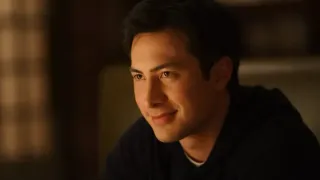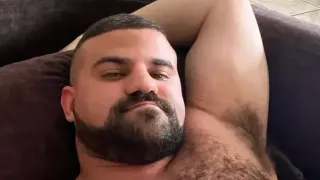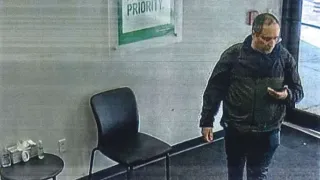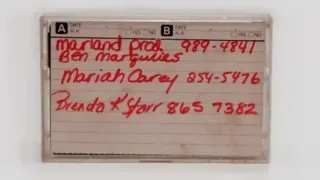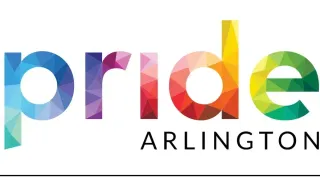July 18, 2024
JP Karliak Voices Morph in 'X-Men '97' and is Changing the Queer Voice-Over Industry
Timothy Rawles READ TIME: 5 MIN.
JP Karliak is a person of a thousand voices – or at least he's attempting to be. His vocal cords are behind a few animated series you may already know such as "Boss Baby" or the recently Emmy-nominated Disney+ hit "X-Men '97," a reboot of the classic '90s animated show. It's not a career you would think carries some LGBTQ+ industry responsibilities or political influence, but in a way, it does. Keep in mind his character Morph in "X-Men '97" is non-binary; they are a shapeshifting genderfluid superhero. It was a change made to the original's source material.
"I think the beauty of Morph is that Morph was written by queer writers," says Karliak in an interview with EDGE.
That's important because there are still some people who think Hollywood wants to bury their gays both on and off screen even after it claims to be more inclusive. The situation is bad enough that Karliak started a non-profit for LGBTQ+ voice actors. We will get to that a little later.
Karliak was always obsessed with cartoons. As a child, he didn't realize real people were the ones behind his favorite colorful characters. After figuring out the truth, there was another misconception; he thought you had to be famous to be a voice actor.
"My naive mind was like, OK, so I'm gonna go to Hollywood, I'm gonna become famous and then they'll let me do voice-over." Even then he didn't realize people got paid to do it – it seemed more pleasurable than professional.
Originally from Scranton, Pennsylvania, Karliak moved west to University of Southern California for college. He pursued theater and did some on-camera work. It seemed he was on his way to becoming a player in Tinseltown, but he was missing something... an emptiness that his subconscious wouldn't let him forget.
"There was always the bug of voice-over nagging at the back of my mind," he says. "And I had a professor at USC who encouraged me to study VO which I did and I started getting into that and I was moving ahead in that part of my career way faster and with way more affirmative success. I guess I was getting to play a wide variety of things as opposed to on camera where I wasn't booking a lot, and when I was, it was very typecast."
His first voice-over gig was for a 2007 video game called "World in Conflict." It was a fictional war game about The Soviet Union invading the Pacific Northwest in 1989. He was cast as a "fluffy weather reporter in Seattle."
"I'm kind of like the narrator of things going on in different cut scenes throughout the game. The reason I remember this so clearly (and the funny thing about it was) they decided it was too light-hearted a framework. So, they ended up scrapping all that and they replaced me with just regular voice-over narration done by Alec Baldwin."
One of the things that Hollywood doesn't seem to like is "gay voice," or rather "pink voice" as Karliak calls it. It's a heavily heteronormative environment with a track record of keeping its gays stereotypical or tragic. That has changed slightly over the past 10 years but it is mostly due to omission, especially in the mainstream space. Unless the genre is LGBTQ-specific, queer cinematic diversity is currently having a drought. Then there is the "woke" side of things where the industry is criticized for overcompensating its lack of diversity in the past by reworking classics into content more variegated than the Pride flag.
That modus operandi permeates into the voice-over field. It's a bit more lenient but still exists. Karliak says that he is privileged to have one of those voices that he can mold into a bunch of things. They are the building blocks from his trauma, "Or maybe," he adds, "because so much of my code-switching was developed into me doing characters."
"I was always trying to emulate the way other people talked, the way other people moved, you know, to try and get in and not be seen. It's strange, there's more inclusion, there's more queer characters that are being seen out there. But I think we're just turning the corner in that those queer characters are allowed to not sound in a cis-heteronormative manner," Karliak says, adding that voice actors don't have to sound "pink voice-y" to identify gay characters; that's a stereotype.
"But there are still the limitations of, you know, if somebody who identifies as male, who has a more effeminate sound to their voice, are they necessarily going to book Superman? Well, maybe not right now."
Karliak might be able to change that. He has a business called Queer Vox Academy, a non-profit that provides training and professional guidance for LGBTQ+ voice actors.
He says he wants to find ways to open the doors by providing training and networking opportunities to queer people interested in the voice-over industry who aren't sure where to start or don't know anything about casting, such as the questions they shouldn't be afraid to ask or the problems they keep running into.
There is a pipeline of responsibility he says.
"Because it's not just up to a casting director, it's up to executives, showrunners, writers. I mean, all the way down to fellow actors and marketing professionals, because I think one of the things that people often drop the ball on is that if [showrunners] bother to cast authentically and even have a queer writer and do a beautiful story, their marketing team doesn't brief the talent on how to do interviews, they don't offer any protection or run interference on social media when the trolls might come out."
Karliak thinks Disney is lucky to have him because Queer Vox Academy prepares voice actors for what's ahead. "I know how to do all this. I know the talking points. I know how to tell my fellow cast or other people the questions that we need to have asked or answered in advance. There's some people that get blindsided, especially new talent. This is their first gig and they get asked all of this stuff and they're like, 'I don't know.'"
Hopefully, his clients can book as many gigs as he has. Karliak has voiced, among other roles, "Boss Baby" in a series for Netflix, The Joker in "Suicide Squad: Kill the Justice League," N. Tropy in the Crash Bandicoot video game, and Dante Crescendo in "TrollsTopia." He will also be returning as Morph in the second season of Disney's "X-Men '97."
With all of that success, you would think he never turns down a role. However, he has his boundaries. He said no to a trans character, and another time, an Egyptian god.
"The story itself was being told from such a culturally authentic place that I was like, wait a minute gang. I don't belong here."
In addition to "X-Men '97," he will play a lead character in "The Smurf Movie" opposite Rihanna and Nick Offerman, although he can't reveal his character's name yet.
Beyond that, Karliak says one day he will take on the ultimate role.
"I've played Loki, like I've played so many fun mischief makers and stuff, you know, I think the next White Whale is – and this requires me to actually, like, put in some work – is a character that I write and create. I think that's the biggie. But that's gonna take some work on my part," he said.
For now, Karliak might want to buy something to wear on the red carpet because "X-Men '97" was just nominated for a 2024 Emmy in the "Outstanding Animated Program" category.

